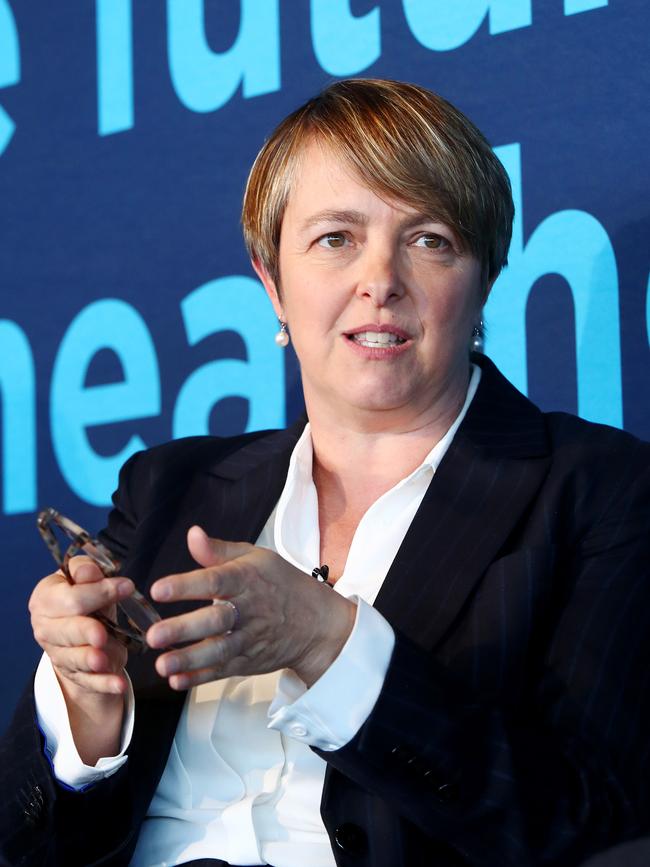
The embarrassing failings of corporate Australia and the strangling influence of enormously prescriptive and inflexible corporate gatekeepers are now becoming material and mainstream economic issues.
A per capita recession, crippling regulation (especially in industrial relations), rising taxes on business, flailing productivity, falling business investment, insolvency rates that may outstrip the global financial crisis – all these are ultimately down to the federal government.
But corporate Australia has been asleep at the wheel, if not downright complicit, in all these emerging threats to our economic wellbeing.
That complicity was driven partly by naivety and partly by incompetence, but significantly because the structures of Australian corporate governance force boards to distract themselves with social and political agendas that include diversity, equity and inclusion measures.
A striking example landed not long after BHP’s Mike Henry was reduced to offering to swap subsidies for BHP’s nickel business for more sensible IR laws. Cue the thoroughly clueless ASX Corporate Governance Council and its latest draft principles for listed companies.
What did these recommendations tell us about what worries corporate Australia? Are they worried about productivity, tax, industrial relations or other regulation? Are they worried about how they were so grossly out of touch with mainstream Australia on the voice or Australia Day? Are they worried their boards and management are living in a bubble, obsessed with teal politics and disconnected from the real world? No. Nothing so prosaic.
At a time when the US is well past the high-water mark of DEI and is back-pedalling on it madly, the ASX Corporate Governance Council is doubling down on DEI.
The major proposal from the ASX corporate governance gurus is to increase quotas for women on boards from at least 30 per cent to 40 per cent and to require disclosure of other “relevant diversity characteristics (in addition to gender)” being considered for board membership.
Additionally, the council wants boards to be forced to report on the effectiveness of their “diversity and inclusion practices”.

That the council’s consultation paper says increased board gender quotas will develop a “range of perspectives” is laughable. Gender quotas haven’t delivered intellectual diversity: they have cemented homogenous views among a group of directors who agree with quotas, and all the associated corporate guff that generally goes with supporting quotas. There are real concerns that never before have Australian listed boards been less diverse – on the matters that count.
No wonder, then, that in the US the DEI crusade has become increasingly discredited. In 2022, two separate California Superior Court judges ruled the state’s laws mandating quotas for, respectively, women and “under-represented” racial and other groups violated equal protection clauses of the California constitution.
Last year, the US Supreme Court ruled university affirmative action policies based on race were unlawful under the equal protection clause of the US constitution.
Soon after that decision The Wall Street Journal reported that major companies were laying off DEI executives.
Coca-Cola had already been forced to abandon a policy promulgated by its general counsel, Bradley Gayton, in 2021 requiring its outside law firms to ensure that 30 per cent of new legal work for Coke had to be performed by lawyers who were women, LGBTQ+, disabled or members of minority racial or ethnic groups.
This year, the pace of change has quickened dramatically. A little over a week ago, The Wall Street Journal reported that a number of states were “trying to extricate their public universities from the DEI quagmire”.
The most striking example was the University of Florida closing the doors on its DEI department and saving $5m from its DEI frolic and ending all DEI contracts with external suppliers. As university president Ben Sasse told the Journal, the worst problem with DEI was the E – equity had trumped equality, which undermined a modern society premised on equality of opportunity.

Importantly for Australia – given we do not have an equal protection clause – DEI has become discredited in the US not merely because it is unconstitutional but because it is a terrible idea.
Right across America the realisation has dawned that DEI is not intended to end discrimination but to perpetuate it. DEI does not aim to end prejudice but to substitute new and different categories of oppressed groups for the old ones. DEI specifically rejects Martin Luther King’s dream of a colourblind America. That shocking realisation hit America’s Jewish community first and hardest. When Harvard president Claudine Gay was unable to bring herself to say that calling for genocide of Jews would violate Harvard’s codes of conduct, Jews realised that all Harvard’s enormous edifice of DEI rules, all Harvard’s intolerance of micro-aggressions, wasn’t meant to help them.
DEI simply established a new hierarchy of victims and if you were low on that hierarchy DEI won’t lift a finger to help.
To borrow again from King, DEI couldn’t care less about the content of your character, all it cares about is the colour of your skin. Or membership of some other preferred group.
This should not have come as any surprise given DEI was, in many respects, simply the popular outgrowth of critical race theory. But it did.
Simultaneously, the US has seen a large and growing anti-ESG (environmental, social and governance) movement.
According to the Financial Times in December last year, 18 states had “adopted some kind of anti-ESG legislation” (although to be fair many states have rejected such laws and four have adopted pro-ESG laws).
Though by no means universal, there is certainly widespread doubt over the propriety of companies or funds imposing the political preferences of their management or board on investors. The Financial Times quoted one prominent fund manager’s argument “that ‘it makes no sense’ to try to impose one universal do-gooder framework on all clients because each of them holds different values. His prediction? ‘ESG will be dead in five years.’ ”
All this has apparently passed corporate Australia, and especially the ASX Corporate Governance Council, by. Here is where the political becomes a matter of economics. The ASX’s individual business failings are matters of record – its botched attempt to replace its CHESS system induces laughter all over the country. Its corporate governance blunders are worse.

The corporate governance council is responsible for enforcing doctrinaire DEI and ESG policies that have hobbled listed companies. No wonder initial public offerings are down and private markets are replacing public markets.
These failures have been aided and abetted by the standard setter for corporate boards, the Australian Institute of Company Directors. Together they have strangled innovation and diversity of thought on Australia’s boards.
This explains their universally uncritical analysis of the voice and their complete lack of understanding of what the Albanese government had in store for them. Economic underperformance is guaranteed by governance cultures such as this.
Which brings us to the puppet masters. Industry superannuation funds wield disproportionate power in corporate Australia. They are union dominated, are chaired by people such as Wayne Swan and Nicola Roxon, are unaccountable to super fund members and are highly politically active, especially when it comes to setting governance standards.
There can be no reform of the governance, and therefore the performance, of corporate Australia unless their stranglehold can be broken. The ALP is a major beneficiary of Big Super’s power as it enables them to muzzle corporate Australia.
Any future change to enhance the performance and culture of Australian corporations will have to be driven by a future Coalition government. Will it be prepared to take on the vested interests necessary to lift Australian economic performance out of the ESG and DEI quagmire?








Corporate governance is no longer a niche concern of interest only to lawyers, company directors and a few policy nerds.